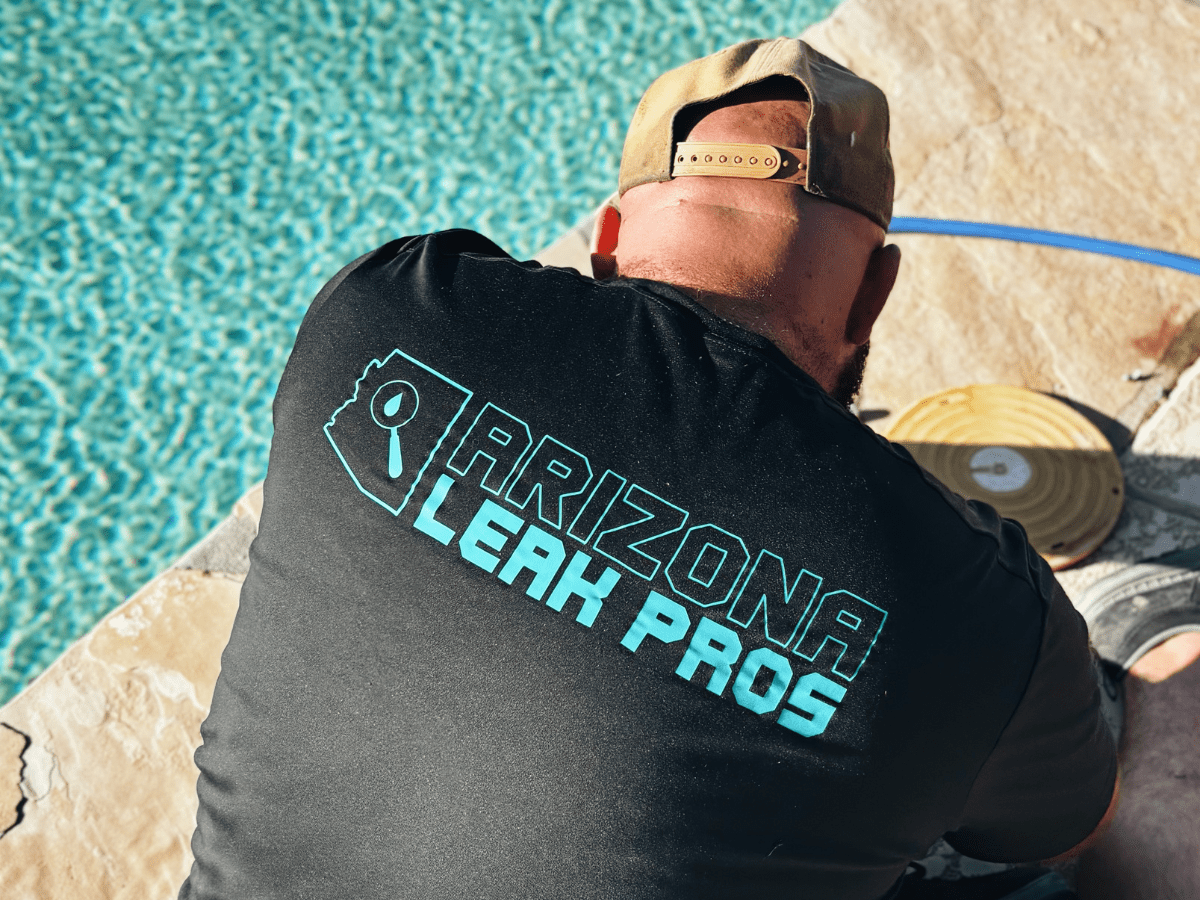Pool Pump Leaking? Here's What Every Homeowner Should Know
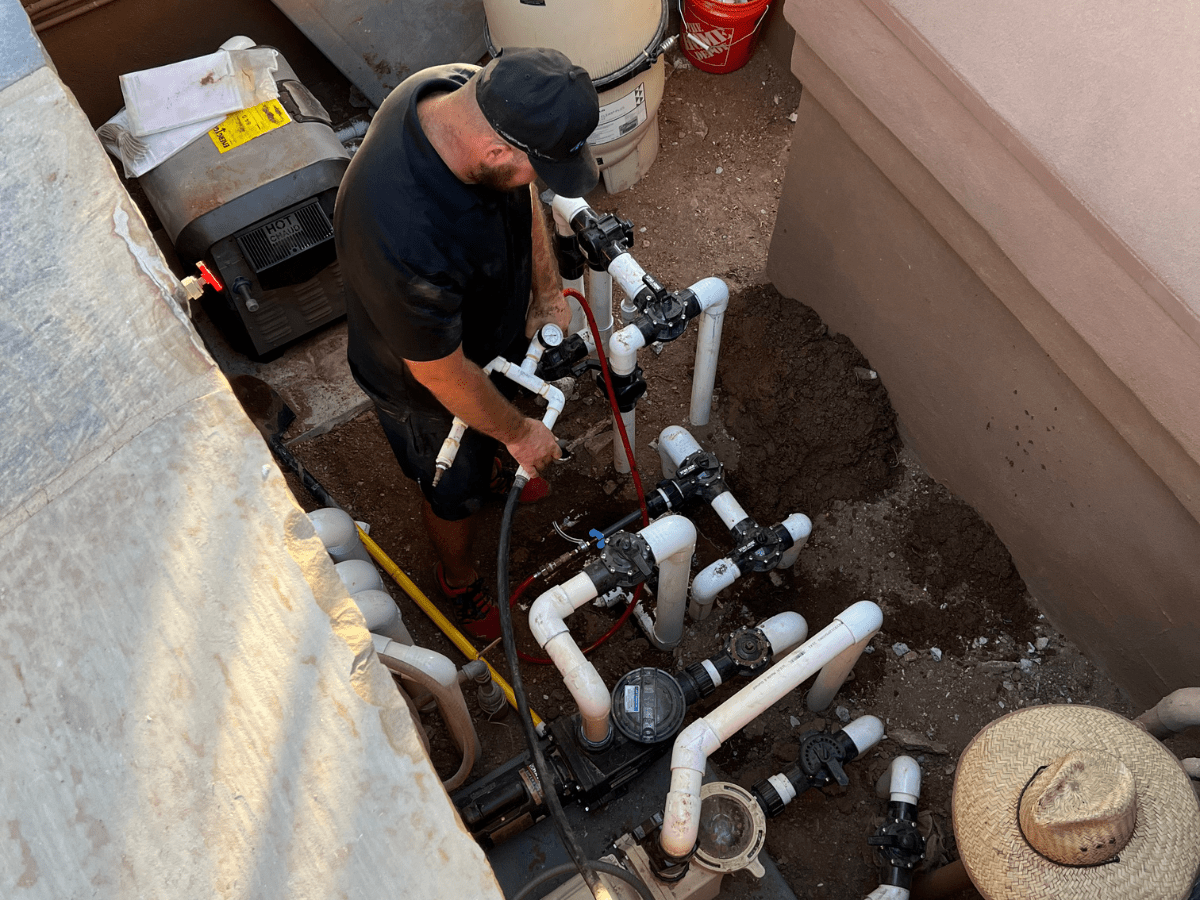
Our Expert Guide to Pool Pump Problems In Arizona
Pool pump leaks are more common than most Arizona homeowners realize, especially in our desert climate where extreme temperatures take a toll on pool equipment. The good news is that understanding the warning signs of a leaking pump and knowing when to act can save you from a major headache and protect your investment.
Whether you're dealing with mysterious water loss, strange noises from your equipment area, or obvious signs of leakage, this guide will help you understand what's happening with your pool and what steps you should take next. From identifying different types of leaks to knowing when you need
professional pool leak repair Phoenix services, we'll cover everything you need to know to keep your pool running smoothly.
Why The Pump Is Critical For A Healthy Pool
Your pool pump is like the heart of your entire pool system. Just like your heart circulates blood throughout your body, your pool pump circulates water through your pool's filtration, heating, and sanitation systems. This circulation keeps your pool water clean, clear, and safe for swimming.
When your pump starts leaking, several costly problems can develop rapidly.
- Water loss means you're literally watching money go down the drain, especially considering Arizona's rising water costs.
- Equipment damage can escalate quickly when leaks allow air into the system or water into sensitive components.
- Most concerning of all, the traveling water can ruin your yard, killing any grass and plants in its path.
- If left alone long enough, it can even begin to cause issues in your neighbors yard or even start to weaken your home's foundation, compromising its safety over time.
Suspect You Have a Pool Leak?
Fill out the form below and we'll get back to you quickly to schedule your leak detection appointment.
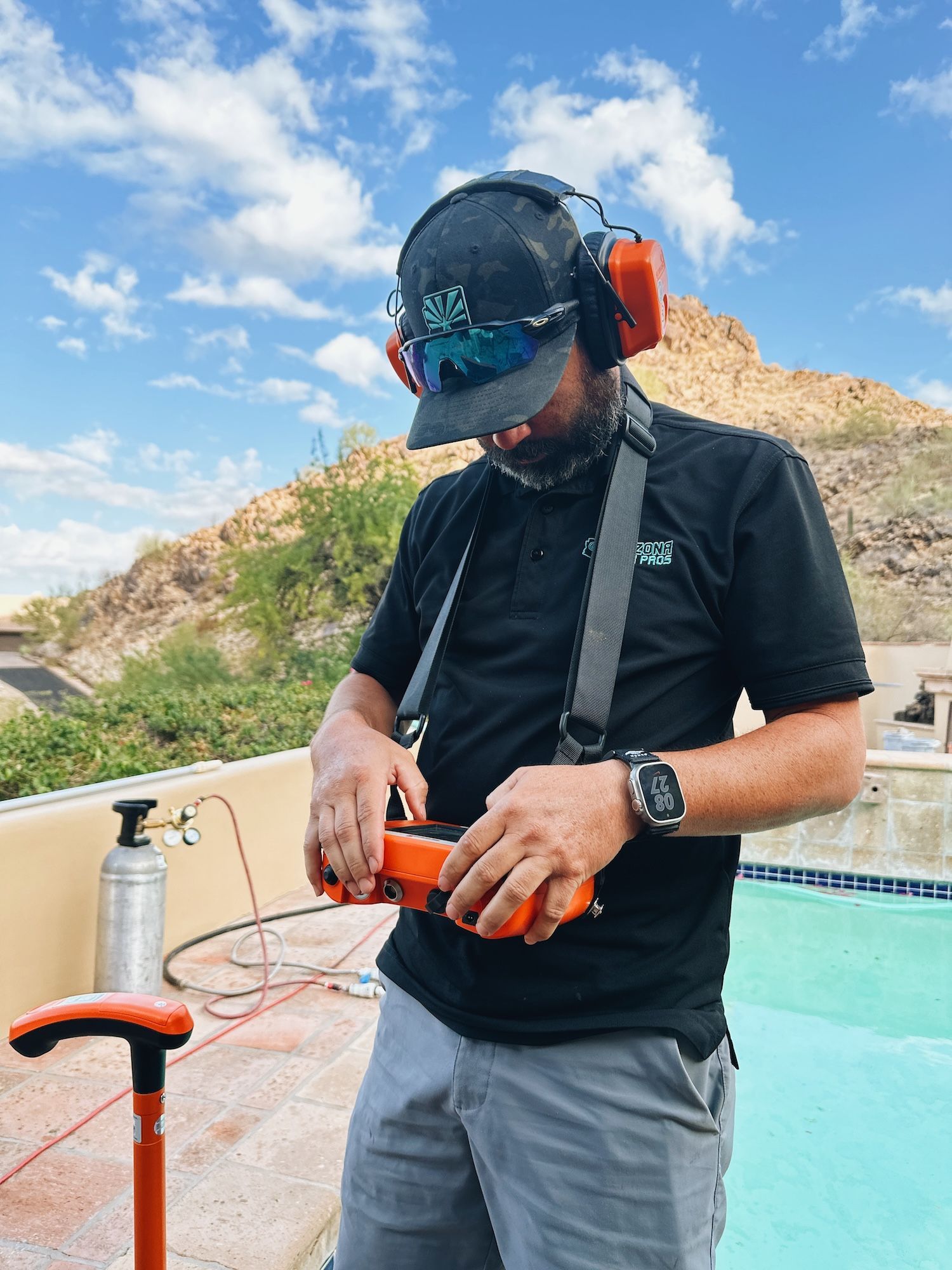
Common Signs Your Pool Pump is Leaking
Recognizing the early warning signs of a pool pump leak can mean the difference between a simple repair and a major replacement. Here are the key indicators every Phoenix pool owner should watch for.
Visible Water Around Pool Equipment
The most obvious sign is water where it shouldn't be. Look for puddles forming around your pump, dripping from pipe connections, or water stains on concrete around your equipment area. Even small drips can indicate larger problems developing inside your system.
Air Bubbles in Your System
While your pump is running, check the water in the pump strainer basket for any bubbles. If you notice bubbles in the water, this means you have a leak on the suction side of your pump. Air bubbles are often easier to spot than water leaks and can indicate problems before they become visible.
Performance Problems
When your pump struggles to maintain proper water flow, loses prime frequently, or shows consistently low pressure readings on your filter gauge, these performance issues often point to leak problems. Your pump may also have difficulty starting or maintaining circulation.
Pump Making Unusual Sounds
A healthy pool pump produces a steady, quiet hum. If you notice any screeching or loud gurgling noises coming from your pump, it might need repairs. When your motor breaks, it may start to squeal, and when your pump doesn't have enough water, it will make a gargling or sucking sound.
Losing Water Beyond Evaporation
In Phoenix's hot climate, it's normal to lose about ¼ inch of water per day to evaporation, especially during the summer. However, if you're losing significantly more water than this, or if your water bills have spiked unexpectedly, a pump leak could be the culprit.
The Three Main Types of Pool Pump Leaks
Understanding the different types of pump leaks helps you communicate effectively with pool leak repair professionals and gives you insight into the urgency and complexity of your situation.
Suction Side Leaks
If you have a suction side leak, this may be due to a cracked pump lid, cracked pipes or valves, low water level, or issues with the o-ring of the strainer basket drain plug or pump lid. These leaks typically involve air being drawn into your system rather than water escaping, which is why you'll often see bubbles in your pump basket.
Pressure Side Leaks
Pressure side leaks occur after water has passed through your pump, where the system is under pressure. Pressure side leaks may occur due to issues with the impeller, the housing o-ring or gasket, the discharge pipe, or the pump housing. These leaks typically involve actual water escaping from your system, making them more visible but also more wasteful.
Shaft Seal Leaks
The most serious type of leak occurs where your electric motor connects to the pump housing. This seal is used to keep water from entering the motor. A leak here can lead to a damaged pump or motor so be sure to get it fixed immediately.
If this seal fails, water can leak into the motor, causing motor failure. To verify that this area is the source of your leak, listen for unusual sounds coming from your pump. This can be a sign that the inner motor bearings are trying to work in the water. Shaft seal leaks require immediate professional attention to prevent catastrophic motor damage.
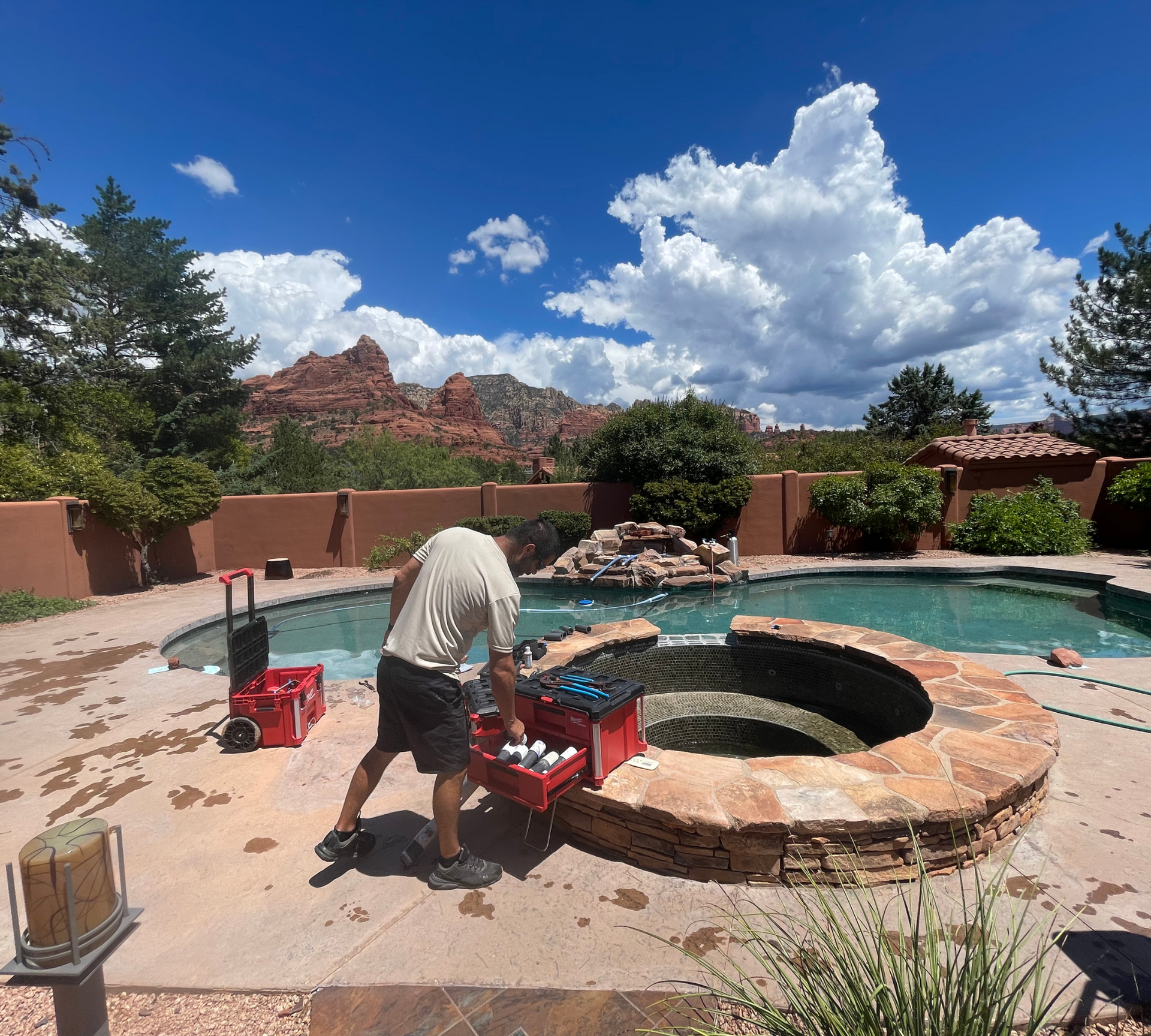
What Causes Pumps To Leak in Phoenix?
Arizona's extreme climate creates the perfect storm of conditions that can lead to pool pump failures. Understanding these factors helps you appreciate why regular maintenance is so critical in our desert environment.
UV Damage and Heat Exposure
Phoenix receives over 300 days of sunshine annually, with UV levels that can quickly degrade rubber seals, O-rings, and gaskets. The intense heat causes these components to become brittle and crack, creating pathways for leaks to develop.
Temperature Fluctuations
While Phoenix is known for extreme heat, desert nights can be surprisingly cool, especially in winter months. These dramatic temperature swings cause expansion and contraction of metal and plastic components, potentially loosening connections and creating stress points where leaks can develop.
Hard Water Effects
Arizona's hard water contains high levels of minerals that can build up inside your pump housing and on seals, affecting their ability to create watertight seals. Mineral deposits can also cause increased wear on moving parts.
Pool Equipment Age
On average, swimming pool pumps last about five years. When your pump is older than this, it might be sluggish or ineffective. In Arizona's harsh conditions, pumps may need replacement even sooner due to accelerated wear.
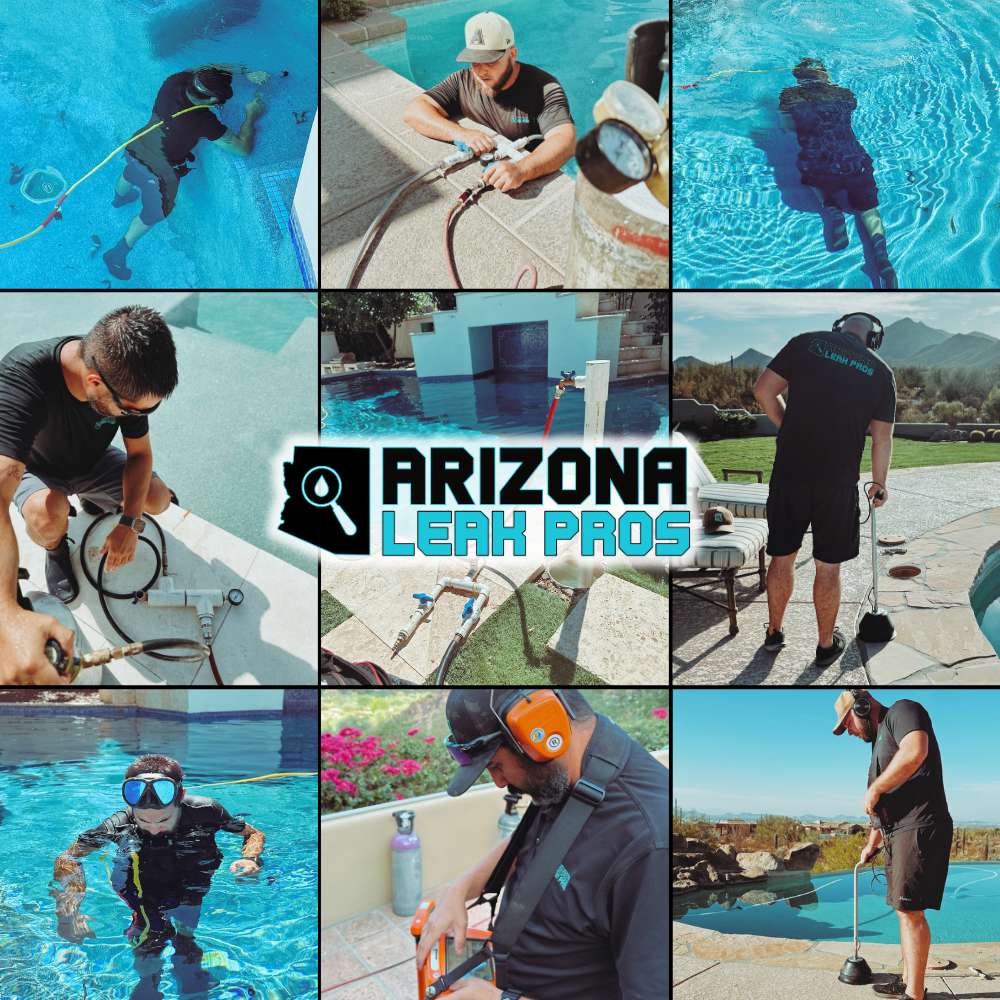
The Hidden Costs of Ignoring Pool Pump Leaks
Many homeowners underestimate the true cost of delaying pool pump repairs. What starts as a minor leak can quickly escalate into a major financial burden.
A small leak that loses just one inch of water per week wastes approximately 500 gallons monthly, turning into significant money down the drain with Phoenix's rising water rates. More seriously, what might start as a $100 seal replacement could become a $1,500 pump replacement if water reaches the motor.
Pool leaks don't just affect your pool. The leaking water can soften and erode soil around your pool, potentially creating sinkholes that damage your pool's cement, plaster, and tiles. Meanwhile, struggling pumps lead to poor circulation, increased chemical consumption, and persistent water quality issues that make your pool less enjoyable and more expensive to maintain.

Prevention Tips Pool Owners
Preventing pump leaks is far more cost-effective than repairing them. Arizona pool owners should implement regular maintenance and other prevention strategies to protect their equipment from our harsh desert conditions.
- Protect your pool equipment from direct sunlight by installing a shade structure over your equipment area or relocating equipment to a naturally shaded location when possible.
- Schedule qualified pool technicians to inspect your pump and related equipment at least twice annually, with spring and fall inspections catching developing problems before they become expensive emergencies.
- Make it a habit to visually check your equipment area each week when conducting regular maintenance. Look for new puddles, listen for unusual sounds, and note any changes in water level or circulation patterns.
- Maintain balanced water chemistry through regular testing and adjustment to reduce corrosion and mineral buildup that can contribute to seal failures and leaks.
- Replace O-rings and gaskets on a regular schedule rather than waiting for failure, since these relatively inexpensive components act as silent guardians that prevent leaks and ensure smooth operations.
Taking Action When You Discover a Pool Pump Leak
Don't let a small leak become a major disaster, as the cost of professional diagnosis and repair is minimal compared to the potential expenses of motor replacement, property damage, or foundation issues that can result from ignored leaks. If you're experiencing any signs of pool pump problems, take action today and contact Arizona Leak Pros for professional assessment and reliable pump leak repair services that will keep your pool running efficiently through many more Arizona summers.

